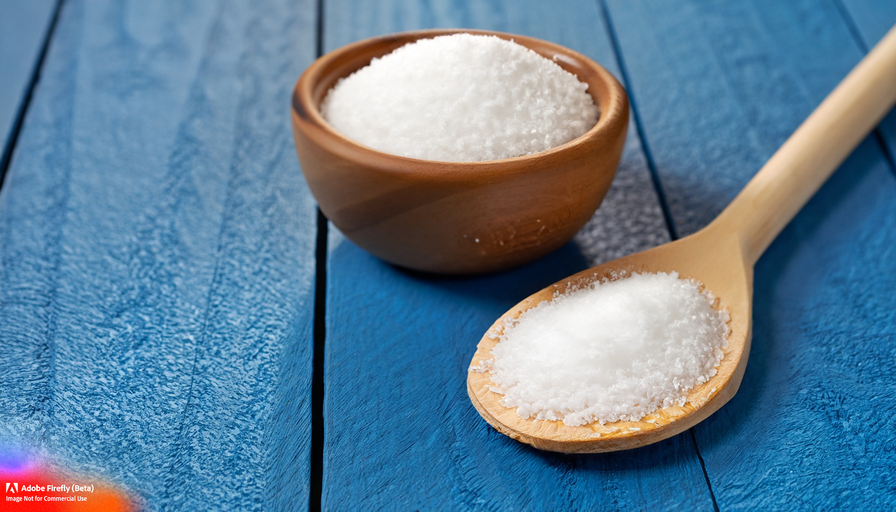Is Monosodium Glutamate Bad for You?
What is monosodium glutamate and why is it used in so many foods? Do you know its possible effects on your health and how to avoid them? Being one of the most widely used and popular additives today, it is well worth checking out.
Monosodium glutamate is the sodium salt of glutamic acid, an amino acid found naturally in many foods that produce umami, the fifth basic taste. It is obtained through a fermentation and refining process from products such as sugar cane or cereals. It is used as a food additive and is a major food flavor enhancer, which serves to exaggerate the inherent flavor of foods.
In this article, we will explain how monosodium glutamate can affect your health, which natural foods contain it, which foods it is added to as an additive, and when to choose healthier options. By the end of the article, we hope that you have a clearer idea about this controversial food additive.
Este artículo también está disponible en Español
What negative effects does monosodium glutamate have on health?
Monosodium glutamate is an additive that is considered generally safe by the US Food and Drug Administration (FDA) and the European Union, provided it is consumed in moderate amounts and within established limits. However, its use is still controversial, as some people may experience adverse reactions or side effects when ingesting it.
Although the FDA declared it safe for limited usage, they enlist several potential side-effects linked to increased MSG consumption, like cardiac, circulatory, gastrointestinal, muscular, and neurological disorders. Some studies have even hinted at possible toxic effects of MSG such as CNS disorders, obesity, alterations in adipose tissue physiology, liver damage, CRS, and reproductive dysfunction.
Below we will review some of the negative effects that MSG may have on health, based on scientific studies and reports. enlist several potential side effects linked to increased MSG consumption. Cardiac, circulatory, gastrointestinal, muscular, and neurological disorders are some of the common examples
Chinese restaurant syndrome

One of the best-known effects is the so-called Chinese Restaurant Syndrome, which consists of symptoms that appear after eating foods containing monosodium glutamate, especially when eating Asian food. These symptoms may include:
- Headache or migraine
- Muscle tension
- Redness of the skin
- Increased sweating
- Burning in the mouth
- Facial swelling
- Intestinal disorders
These symptoms are usually mild and transient and do not require medical treatment. However, they can be very annoying and affect the quality of life of the people who suffer from them. It is not known for sure what causes this syndrome, but it is believed that it may be related to individual sensitivity to MSG or an interaction between this additive and other ingredients such as sodium or preservatives. The only way to prevent it is to avoid eating foods that contain monosodium glutamate.
Hormonal Changes
MSG might interfere with hormonal signals that regulate hunger and satiety, making people feel hungrier and less full after eating. This could encourage overeating and make it difficult to control your weight.
MSG could also affect the hormonal balance of other functions such as the menstrual cycle, fertility, or stress. MSG has also been associated with male reproductive dysfunction by triggering a hemorrhage in the testis as well as deterioration of sperm cell structure and production.
Appetite and Satiety

MSG enhances the flavor of food and makes it more enjoyable to eat. However, this can also affect appetite and satiety signals in the brain and body, making people feel hungrier and less satisfied after eating foods with MSG. This can lead to overeating and weight gain, especially on a high-calorie diet.
MSG can alter the balance of neurotransmitters and hormones that regulate hunger and satiety (such as leptin) and stimulate taste buds and the brain’s reward system. These effects could generate a kind of addiction to monosodium glutamate or to foods that contain it since people would seek to repeat the pleasant experience of eating them and satisfy their hunger.
Therefore, it is important to limit your intake of monosodium glutamate and pay attention to hunger and satiety cues.
MSG and the Central Nervous System
Studies conducted in mammals show that MSG can influence various aspects of brain function and structure, such as neurotransmitter levels, brain activity, cell death, neuroplasticity, and neurogenesis. It also can affect flavor preference learning, metabolism, protein turnover, and antioxidant defense in the body. These studies noted that the effects of MSG vary depending on the species and age of individuals.
MSG and the Cardiovascular System

MSG can affect the cardiovascular system by causing oxidative stress, inflammation, and damage to the heart cells and tissues, as well as altering the heart rate and blood pressure. MSG can contribute to obesity and dyslipidemia, which are risk factors for cardiovascular diseases. However, studies that used high doses or different routes of administration of MSG than those typically consumed by humans are limited so further studies are required.
Damage to Vital Organs
MSG could cause damage to the liver, kidney, and other organs associated with endocrine function, such as the pancreas or thyroid. This could be because MSG increases transaminase levels in bile and induces apoptosis (programmed cell death) in the kidney. It could also cause inflammation, oxidative stress, or fat accumulation in the liver.
Allergies
Monosodium glutamate could cause allergic reactions in some people, such as rashes, hives, itching, or difficulty breathing. This could be because MSG acts as an allergen or as a releaser of histamine, a substance that triggers allergic responses.
Neurological Disorders

MSG could have negative effects on the brain and nervous system by overstimulating glutamate receptors, which are involved in learning, memory, and cognition. This could lead to excitotoxicity, a condition where nerve cells are damaged or killed by excessive stimulation.
MSG ingestion has been linked with various neurological disorders such as Parkinson’s disease, Alzheimer’s disease, addiction, brain trauma, anxiety, stroke, depression, and epilepsy.
Other Health Problems
Besides the above-mentioned effects, MSG could also contribute to other health problems such as asthma, cancer-induced obesity, diabetes, and oxidative stress.
Toxicities such as hepatotoxicity (liver damage), genotoxicity (DNA damage), reproductive toxicity (fertility impairment), and renal toxicity (kidney damage) have also been reported to accompany MSG intake.
As you can see, MSG can have negative health effects if consumed in excess or if you are sensitive to it. For this reason, it is important to moderate its consumption and be attentive to the possible symptoms that it may cause.
What natural foods contain monosodium glutamate?

Monosodium glutamate is an additive that is obtained through a fermentation and refining process from products such as sugar cane or cereals. However, MSG is also found naturally in some foods that contain glutamic acid, an amino acid that produces umami, the fifth basic taste.
Some of the natural foods that contain monosodium glutamate are the following:
- Parmesan, roquefort, emmental or cheddar cheese
- Ham
- Walnuts
- Mushrooms or shiitake mushrooms
- Tomatoes
- Peas
- Beef or chicken
- Algae
These foods can add flavor and nutrients to our diet, provided they are eaten in moderation and as part of a balanced and varied diet. However, keep in mind that natural MSG is not the same as a synthetic additive, as the latter is added in much larger amounts and can have negative health effects.
Therefore, it is important to read the labels of processed or prepared foods and avoid those that contain monosodium glutamate as an additive or under other names such as hydrolyzed protein or autolyzed yeast extract. This way we can better control the consumption of this additive and prevent possible adverse reactions or side effects.
To which processed or prepared foods is MSG added as an additive?

Monosodium glutamate is an additive that is added to many processed or prepared foods in order to enhance their flavor and make them more attractive to the consumer. However, many times it is not easy to identify it on the labels, since it can appear under different names or codes.
To help you identify MSG present in some prepared foods, here is a list of some of the names or codes used in packing labels to hide monosodium glutamate:
- E-621
- Hydrolyzed protein
- Yeast extract
- Malt extract
- Sodium caseinate
- Jelly
- glutamate
- Glutamic acid
Some of the processed or prepared foods that usually contain monosodium glutamate as an additive are the following:
- Instant or canned soups
- French fries or snacks
- Doritos and similar
- Maruchán (noodle soup)
- Instant meals
- Ketchup
- Pre-frozen dinners
- Salad dressings
- Corn fritters
- Grilled or smoked meats
- Sausages
- Prepared spices
- Concentrated bouillon
- Broths and sauces
These foods may contain high amounts of monosodium glutamate and other additives that can affect health if consumed excessively or frequently. For this reason, it is important to limit your consumption and opt for natural or homemade foods that do not contain this additive or that contain it in less quantity.
Conclusion
Monosodium glutamate is an additive that can make food taste better, but it can also have negative consequences for your health. Although it is generally considered safe by the US Food and Drug Administration (FDA) and the European Union, as long as it is consumed in moderate amounts and within established limits, exceeding these limits can have serious health consequences.
But, how much is too much MSG? There is no clear-cut answer to this question, as people may vary in how they respond to it. Therefore, it may be wise to avoid foods that contain MSG, especially since it can make you eat more and feel less full, which can lead to exceeding the limits.
Our advice is to opt for a natural and homemade diet, which provides you with all the nutrients you need without exposing yourself to the risks of monosodium glutamate. In this way, you can take care of your health and well-being in a simple and effective way.
We hope this article has helped you to better understand monosodium glutamate and its effects. If you liked it, share it with your friends or leave us a comment. Thanks for reading us!







The article on “Is Monosodium Glutamate (MSG) Bad for You?” by Body Back to Basics sheds light on an important and often debated topic surrounding the use of MSG in food products.
I found this article to be informative and well-researched, providing a balanced perspective on the subject. The author begins by explaining what MSG is and its common uses in the food industry. They then delve into the controversy surrounding MSG, addressing both the potential negative health effects and the scientific evidence that suggests it may not be as harmful as previously believed.
“Is Monosodium Glutamate (MSG) Bad for You?” offers a balanced and evidence-based discussion on the topic. It encourages readers to consider individual sensitivity and make informed decisions about their own consumption of MSG.
Hi, thank you for your comment. I appreciate your positive feedback and your thoughtful summary of the article. I’m happy to hear that you found the article informative and well-researched. MSG is a complex and controversial topic that requires careful consideration and individual judgment. Thanks for reading and sharing your insights.
I always knew that too much MSG can be bad for you as I have friends who suffer from bad headaches when eating MSG. However I didn’t know about all the other problems you mentioned in this article, like damage to vital organs and making you ear more than you should. We get Chinese food pretty regularly,so we will definitely have to cut down there. Thanks for sharing this.
Hello, thanks for your comment. I’m glad you found the article informative and useful. It’s good to know that you’re willing to cut back on Chinese food, although you may find MSG-free options. I hope you enjoy a healthier and happier life without MSG. Thanks for reading and sharing your thoughts.